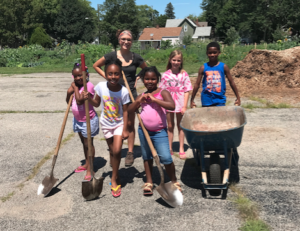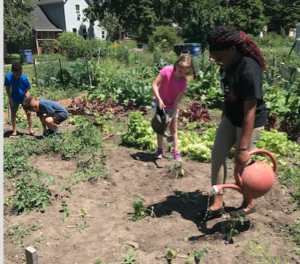Final report for YENC17-111
Project Information
Our original project abstract: Forty six youth will be educated in sustainable vegetable growing and value added production. Four experienced high school staff who have worked at our 3-acre CSA urban farm for 2 years will lead a summer garden club and cooking club for elementary youth. The clubs will teach elementary youth to grow and cook produce from a 10 X 20 ft. garden plot. Ten middle school students will participate in the summer apprenticeship program, working alongside high school staff. Twelve additional high school youth will be hired for our farm and will learn sustainable agriculture through hands-on learning.
2017 results: Seventy six youth were involved in different forms of sustainable vegetable growing and value-added production. Eight high school student staff led gardening and cooking clubs over the course of the spring and summer. Fifty elementary youth grew and cooked produce in our community garden plot, as well as from our urban farm (over the spring and summer). Ten middle school students harvested produce from our farm and worked alongside high school staff to prepare and sell farm-to-table value-added products in our new cafe. Eight additional high school staff (who are not already included in the number who led clubs) were hired to work on the farm, and two additional high school staff were hired to work as managers in the cafe.
As we move forward we are very aware that our high school leaders needed more support in order to run their clubs and programs well. We launched a cafe (selling soups, salads, wood-fired pizzas, and baked goods all made from farm produce) in 2017 without adding any adult staff. We relied heavily on our high school leaders and managers. They did an incredible job, but it became apparent that we needed more adult staff to provide supervision and support. We plan to add additional staff in the coming year that will more directly supervise these programs.
2018 results: We continued with our cooking and gardening clubs but this year provided more support to our summer club through a partnership with MSU Extension. They led our gardening club, working alongside our high school staff. A volunteer led our cooking club with high school staff. This resulted in more support and better programming. Overall, from May-August in 2018, 63 youth were involved in cooking or gardening at our location. We did not need as much funding for supplies as we originally budgeted for, so we put the additional funds to use towards our high school student leaders' wages.
- Empower youth in our neighborhood to reach their full potential through youth programming, youth employment opportunities, community gardening, and growing local food. This objective was accomplished in 2017 and continued into 2018.
- Develop student employees’ business, cooking, and gardening skills by involving them in every aspect of our CSA farm operation and value added cafe. This objective was accomplished in 2017 and continued into 2018.
- Introduce elementary and middle school students to sustainable agriculture through lessons taught by high school students employees. This objective was accomplished in 2017 and continued into 2018. In 2018 we had more support by developing a partnership with MSU Extension.
- Extend impact of program to wider community through presentations by youth farm managers to other farmers and youth educators, to their schools, and in the form of a YouTube video of their work shared via social media. This objective was not accomplished in year one of this grant, but in year two we were able to take our garden club leaders to do presentations to youth at Ada Congregational Church. They led lessons on gardening, vegetables, and healthy food choices (including taste testing). Students also participated in the Michigan Good Food Summit this year, and hope to submit a proposal to lead a workshop next year. We have not done the video series as a part of this project, as it was not something that fit our needs at this time.
Educational & Outreach Activities
Participation Summary:
Our original outreach and educational plans included: Our four youth farm managers would be coached by our Farm Director so they could prepare and lead a presentation to other farmers and youth educators. New City Neighbors is well connected to the surrounding farming community and the surrounding youth education community. New City Farm has been a long time member of the West Michigan Growers Group and was a cofounder of the Grand Rapids Urban Growers Group. This group meets monthly and a presentation could be given at this group of approximately 15 farms (30-40 farmers per meeting). We could also present at the Food and Faith series which is a network of faith based organizations doing Good Food work. In addition, we would apply to present at several conferences including the Good Food Summit, The Small Farmers Conference in Traverse City, and the Michigan Family Farms Conference.
Further, the high school student staff would approach the schools they attend to see if they could give a presentation of their work to their school. They also would plan a day at the end of the summer to share the accomplishments of the cooking and gardening clubs with student’s families. The purpose of this would be to celebrate the student’s work, but also encourage families to garden at home or in their own community garden plot.
2017 report and plans for 2018: In 2017 we recognized we did not have the adult staff capacity to mentor and support the high school students in achieving these outreach and education goals. In 2018 we plan to hire a full time staff member whose focus will be on supporting the high school staff. With this added capacity we will be able to achieve our original goal of two student presentations.
Additional note: the numbers represented above relate to activities outside of our youth programming. In terms of our youth programming, two six-week sessions of gardening and cooking clubs took place in the spring (back to back, February-May), and one seven week gardening and cooking club session took place during the summer. These clubs involved hands on learning and education from our high school student leaders to the elementary school students.
Update for 2018 and plans for 2019: In year two we were able to take our garden club leaders to do presentations to youth at Ada Congregational Church. They led lessons on gardening, vegetables, and healthy food choices (including taste testing). Students also participated in the Michigan Good Food Summit this year, and hope to submit a proposal to lead a workshop next year. We have not done the video series as a part of this project, as it was not something that fit our needs at this time.
This past summer we ran two 7 week clubs- the gardening club was led by MSU Extension and high school staff weekly, and the cooking club was run by two volunteers and high school staff members weekly. Based on the success of our partnership with MSU Extension this past summer, we plan to continue our relationship with them throughout the coming year. They provided two MSU Extension staff and one intern who planned lessons from "The Great Garden Detective" alongside our high school student leaders. This year, we have agreed to sign all of our youth up to be 4-H members to give them access to even more educational resources. We also have made an agreement with the YMCA of Greater Grand Rapids to run our Cooking and Nutrition Education Clubs. They use a "Cook it Up!" Curriculum that is based off of Cooking Matters, a USDA approved curriculum. Our 2017 gardening clubs kicked off this great work and ability for us to develop these meaningful partnerships that will continue on into the future. We will plan for each of our elementary school students to participate in one cooking and one gardening club per academic year, and one club in the summer.
Learning Outcomes
Sustainable agriculture
Gardening (where food comes from, basic plant education)
Cooking & Kitchen Skills
Youth Education &Leadership
Healthy Habits
Project Outcomes
In 2017 we relied on high school student managers to lead in a lot of new ways. This grant helped to fund these positions, especially as they led the gardening and cooking clubs. We discovered that this increased our organization capacity, but also that we needed more support for our high school student staff. This grant provided funding that did increase our capacity, but also helped us identify a need to continue to grow in order to do our work well.
We have not assessed if parents have adopted any sustainable agriculture practices at this point in time. This is an area we can assess in 2018.
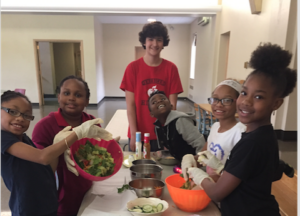 We began our cooking clubs in the spring, pictured to the left is our first club. The high school leader pictured had spent the previous summer and fall working on the farm and in our kitchen, and was using his learned knowledge to share with the elementary students. Students in this photo are preparing a salad, which they then sat down and enjoyed together.
We began our cooking clubs in the spring, pictured to the left is our first club. The high school leader pictured had spent the previous summer and fall working on the farm and in our kitchen, and was using his learned knowledge to share with the elementary students. Students in this photo are preparing a salad, which they then sat down and enjoyed together.
We continued the clubs into the summer. One day, during our summer day camp program, fifth grade students in the cooking club went with student staff members out to our farm's field to harvest collards and kale. After they harvested the kale and collards they brought them back into the kitchen to prepare them to eat for lunch. This group was led by the Kitchen Director and two high school student staff who had previously worked as farm staff in the past. When lunch was served, including the greens, our Kitchen Director noted that many of the students opted out of the greens, but all of the students who had harvested and cooked them took some on their plate. This anecdote helps confirm our hypothesis that if students harvest and participate in the preparation of their food, they are more likely to try it.
Pictured below: students in the cooking club preparing the collards that they harvested from New City Farm.
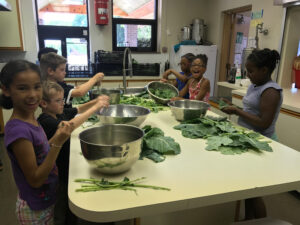
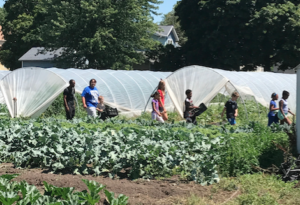
On another summer day an elementary student in the gardening club was picked up by their parents. When the student saw his mom he shouted, "Mom! Guess what!? Today I ate raw kale!" His mother was shocked, and offered praise to the leaders for encouraging her son to try new vegetables. These are the types of conversations we want our students to be having with their families.
Lastly, high school student leaders reported being stretched in their knowledge and skills as they worked hard to translate their own learning on the farm to the younger students. Here is an excerpt from a blog post made on July 12, 2017: "You may have seen Julia and Assariyah at the share pick up this summer. They both began working on the farm this past spring. They have been enjoying their work as well as meeting new people and making new friends. We are thankful to have them on our farm staff team, sharing their gifts and skills with our community.
As part of their work this summer, they are leading elementary students in a gardening club! Students who are a part of our New City Breaktime summer program have their own garden plot in the community garden. Julia and Assariyah are using the plot for the gardening club. They hope that students will learn that they can grow their own food, develop healthy habits, get their hands dirty, and enjoy being outside in nature. They both agree that leading gardening club has given them an opportunity to learn new skills. Julia explained that Lance helps them by sharing ideas, but leaves all the planning and preparing for them. “It’s really student-led,” Julia shared and Assariyah agreed, “it’s an opportunity to lead in a way that is like the real world, it’s our responsibility.”
They also agree that working with the younger students is both fun and funny- the kids have a lot of energy and offer you a different perspective on things. “They ask a lot of questions,” Assariyah said, which they both agreed helped them to learn more as they have to be prepared to respond the student’s curiosity. “I was explaining pollination to them this week and I had to figure out a way to explain it that would make sense to kids,” Julia reflected.
When you see Julia or Assariyah at the farm share pick up, or around the farm, stop and ask how their club is going!"
Original blog post can be found our our website: http://newcityneighbors.org/meet-julia-assariyah-farm-staff-garden-club-leaders/
Pictured below: Julia & Assariyah leading their club.
